- Home
- Michael Crichton
Drug of Choice Page 13
Drug of Choice Read online
Page 13
“I’m very eager to begin work,” Clark said, rubbing his hands together.
Washington gave him a funny look.
“Is something wrong, George?”
“No,” George said. “It’s just…well, sometimes I can’t believe it myself, is all. You’re a new man, Roger.”
“I know it. I feel like a new man.”
“Yes, I’m sure you must,” Washington said. “Well then: down to business, eh? I’ll show you around your lab, and then you can get right to work. Oh, by the way, Harvey wants to see you.”
“Harvey wants to see me?” It was an honor, the president of such a fine company wanting to see him.
“Yes,” George said. “Come along.”
Roger met with Harvey and George in the big office. They were both very happy, and Roger felt happy as well. He was extremely eager to begin his work; he could hardly contain his excitement. It was such a wonderful company, so dynamic and interesting.
After that, George took him to the lab, which was ideally equipped, everything a man could ask for. And a smashingly beautiful technician who seemed very interested in him. They showed him where everything was stored, including the two vials of powder, one white, the other pink.
“Now then,” George said, his voice ringing with enthusiasm, “these are the drugs you’ll be working with. The drug of choice here—” he raised the white vial “—and the reversal drug here.” He held out the pink vial. “You’ve had some experience with these before, so you know how vital and important this work is.”
There was no question of it in Roger’s mind. It was not only important, it was fascinating. It presented a huge intellectual challenge, a great stimulus.
“What we need to know,” George said, “is maximum dosages for these drugs. We’ve been using it cautiously, because we don’t know upper limits. But we suspect that we are not getting the maximum benefits from the drug administration. That’s where you come in. We want you to set those limits of dosage. You’ll work with animals at first, and later, when you’ve done the groundwork, with people.”
It was thrilling, Roger thought. In his mind, he could see the endless experiments he would perform, and his steady progress toward an eventual solution to this fascinating project.
“Just one word of caution,” George said. “These drugs are both very potent, and very valuable. Manufacture is still expensive, and there is only one person who does it.”
“Only one?”
“Yes. Harvey. He’s the only one that knows the formula, and he won’t tell anyone else.”
That seemed strange to Roger at first, but as he thought about it, he could understand the reasons. Harvey was being careful; he ought to be careful. Those drugs could be dangerous in the wrong hands. They could be…well, exploited.
“You see, Roger, this firm is making all its money at the present time from this drug, and its use on the island. Funds from that are financing all the research in this large building, and all our projects, like Sharon Wilder and the Glow Girl.”
Roger nodded. Two excellent projects. Nice young girls given a chance in a lifetime to make good. Very worthy and charitable projects.
“So Harvey is playing it close. And he limits the amount of drug he is making available. So don’t drop it or lose it or anything.”
“Oh no,” Roger said. “I wouldn’t do anything like that.” George gave him a funny look again, then smiled, and left.
The lab technician said, “We’re going to have a fine time here,” and Roger could only agree. Immediately, he began work.
The next two weeks were the happiest he had ever known. He had a worthy project, and he devoted himself to it during every waking hour. He lived in a pleasant room on the top floor of the building, so it was very convenient. He was close to his work and had no need to leave for anything. Whatever he requested was brought to him instantly. It was a very agreeable place to work.
He saw Sharon Wilder once, and she seemed happy to see him. She asked how things were going and he said they were going wonderfully.
During the second week, he saw Susan Ryle, the Glow Girl. She looked surprisingly different. They had done things to her, cut her hair and changed the way she made up her eyes. She was like a different person. She remarked to Roger that he looked different, too. He was very flattered.
Toward the end of the second week, he began having dreams. At first, they occurred only occasionally, strange and annoying dreams. They disturbed his sleep.
He thought of mentioning them to George, but never did. He was afraid that George would take him off the project if he knew. After all, they couldn’t have an unstable man working on an important project.
And he was feeling a little unstable.
Later, the dreams began to come every night. They were always the same. He was flying an airplane over tropical islands, shining in blue water. He was happy, flying the airplane. And then the airplane would go into a dense fog, and it would start to worry him.
He would wake up in a cold sweat.
Perhaps, he thought, I am working too hard. He took more of an interest in his lab technician, who was interested in him as well. She began to spend nights in his room, and he dreamed less when she was there.
But with time, the dreams progressed. He would fly into the fog, and then somehow he would know that there was an end to the fog, a frightening end. Something outside the comforting, frightening white fog.
He no longer invited the technician to stay with him. He was afraid that he would talk in his sleep, and she would report him to George, and that would mean he would be taken off the project. He couldn’t allow that to happen. Because he lived for that project; it meant everything to him.
Everything.
Sometime during the sixth week, his dreams broke through the fog. He saw what lay beyond, and it was some kind of hideous chair.
Immediately, he woke up. He was shivering and sweating, and angry. He did not understand precisely why, but he was very, very angry.
He got out of bed in a silent rage, and dressed. He had no real idea what he was doing, or where he was going. Once dressed, he looked around the room and saw a large paperweight on his desk. It was heavy plastic, with a piece of rock imbedded inside.
He carried it downstairs with him. As he moved quietly through the halls, his anger was very great; he could hardly wait until he met that damned guard.
As he reached the ground floor, he saw the guard. It was Sam, the night duty man; Roger had met him before in the evenings.
“Hello, Dr. Clark,” Sam said. “Another late night with the experiments?”
“Yes,” Roger said. “Looks like it.”
He let the guard walk past him. Then he turned, and swung with the paperweight. He felt a flash of horror as the heavy plastic struck skull and scalp; the guard fell and bled profusely.
His anger began to die.
The chair, he thought, and it slowly came back to him. Not all of it, but some.
Enough.
Quickly, he took the keychain from Sam’s belt and used it to shut down the alarm. Then he unlocked the front door and went down the steps into the night. Two cars were parked in the lot—a black limousine and a brown sedan, which he guessed was Sam’s car. He tried the keys until he found the one which unlocked the door; he got in and started the engine, and drove down the drive.
It was not until he was on the road that he realized he had no idea where he was going.
It was difficult to think clearly. Images were flashing through his mind, conflicting images.
“They did something to me,” he said aloud. “They did something to my head.”
That was it.
They had done something. And now where?
Dimly, he remembered bits of conversation. “…you’re nothing outside…” “nowhere to go…” “Friends aren’t friends, any more…” Was it true? He wondered.
And then, not knowing what else to do, he drove back to his old apartment.
It
was foolish of him. He should have known it would be watched. When he pulled up across the street from the entrance, he saw the man sitting in the car, and the other man lounging against a lamppost on the streetcorner.
By now, they would know he had escaped. They would be after him. Where could he go?
The police.
But somehow he wasn’t ready to go to the police, not yet. He wanted to talk it over with somebody else, to try out the story, see how it sounded.
Sharon?
No. She’d turn him in.
Harry, the intern?
No. He would be all confused, bewildered, unhelpful.
Dr. Shine?
Perhaps. That was a good possibility. Or Dr. Andrews, the Chief of Medicine at the hospital. But somehow…
Janice Connor.
Of course! He snapped his fingers. Janice would hear him out.
He drove away from his apartment, toward the Strip, and parked at an all-night drive in. The kids were there, laughing and necking in convertibles under the lights. He found a payphone near the restrooms, dropped in his money and dialed.
A sleepy girl answered. “Hello?”
“Janice Connor, please.”
“This is she.”
“Janice, this is Roger Clark.”
For a moment, there was silence. Then: “Who?”
“Roger Clark. You remember me, I’m the doctor—”
“Yes, yes. I remember. Where have you been?”
“You wouldn’t believe it,” Clark said. “They had me locked up in this place, and—”
“Where are you now, Roger?” she said.
“I’m at a drive-in on the Strip. Super-burger, it’s called.”
Another pause. “What do you want me to do?”
“I want to talk to you. I thought if I came over to your place, we could—”
“No, no. It’s better if we meet somewhere else. I’ll come down. Super-burger?”
“Yes.”
“Give me fifteen minutes,” she said. When he hung up, he felt an immense sense of relief.
21. IT’S YOU, ROGER
HE HAD A HAMBURGER and settled down to wait, but as he waited, he began to have odd feelings. He didn’t like to be suspicious, but …
Feeling almost guilty, he drove his car out of the drive-in lot and across the street, parking it a block away, on the hill leading down to the center of town. Then he walked back and stood on the corner across the street from the drive-in.
The night was cool but not cold, and the laughter of the kids was gay and reassuring. When Janice drove up in her Italian sportscar, he felt himself relaxing once more. She was alone; everything was fine. She got out of the car and stood uncertainly, looking around her.
He started to cross the street.
At that moment, he heard the sirens. He froze, moved back to the curb.
Three police cars converged on the Super-burger Drive-in. They pulled up, lights flashing, sirens going. Six cops jumped out, guns drawn.
The kids screamed. The scene was chaotic. There were cries of “Bust! Bust!”
And in the middle of it all, Janice stood frowning and worried-looking. One of the cops came up to her to talk. She answered his questions, shaking her head.
Bitch, he thought, and moved back down the bill. He got into the car and drove off. The night air was making him more clear-headed, and he was remembering more of what had happened to him. He remembered the chair, and the room, and the sounds and fog and shocks. He remembered it dimly, as if it had been a dream.
But it made sense—even as a dream.
Janice, on the other hand. She made no sense at all. Why had she called the cops? And they were cops, no question of it. They weren’t fakes. They were real, live, honest-to-God cops.
And they had come very quickly.
Ergo…
He was a wanted man. Wanted for what?
He drove half a mile to a gas station, got out and made another call, this time to Dr. Andrews. A woman answered. He asked for Dr. Andrews. “Dr. Andrews speaking.”
“Dr. Andrews, this is Roger Clark.”
“Roger?”
“Yes, sir.”
“Roger, where are you?”
Dr. Andrews’ voice was sympathetic and concerned. But wrong: he never called anyone by his first name. Except patients. Clark shuddered.
“Roger, are you there? Where are you?”
“I’m…downtown.”
“But where?”
“In a gas station.”
“Now look, Roger. I want you to stay where you are. Stay right where you are, and don’t get excited. Everything will be fine. Tell me the address of the gas station.”
“Why?” Clark said.
“Now, Roger,” Andrews said, chuckling. “This is no time to be difficult. We only want to help you. Tell me where you—”
Clark hung up.
So Andrews was part of it, too. What had happened? It must have been awful, whatever it was, if the whole town was after him this way.
Certainly he couldn’t go to the police. Not now. Not until he knew more. Then who?
He knocked on the door of the pink stucco mansion. A maid answered hesitantly, opening the door just a fraction. I “Yes?”
“I want to see Dr. Shine.”
“The doctor is not available.”
“He is for me. Tell him it’s Roger Clark. And tell him to hurry—if he’s not out here in a minute, I’ll leave. You understand?”
“Yes.”
The door was slammed hurriedly in his face. Clark stepped back, onto the grass, until he could look up to the second floor. He saw a light go on, probably the bedroom.
He waited on the grass, standing in the darkness beneath a large tree. After a moment, the door opened, and yellow light spilled out on the lawn. A figure emerged.
“Anybody here?”
He recognized Shine’s voice.
“It’s me. Roger Clark.”
“Oh?” The voice was disbelieving. He moved forward onto the lawn as Shine advanced. Clark could not see anything but the silhouette, framed in yellow light.
“Yes. It’s me, all right.”
“Where are you? Let me get a look at you.”
Clark stepped out from beneath the tree. “I want to talk to you—”
“My God. It is Roger Clark.”
And Shine fired. There was a spurt of flame from his waist; Clark threw himself to the ground and rolled. Another shot and still another. He rolled across the wet grass, down toward his car.
“Give up, Clark. It’s over. You’ve had it.”
Another shot rang out. But by now he had moved away from Shine. He got up and ran for his car, jumping behind the wheel. A shot shattered the rear window. He started the car, and drove off.
In the rear window he saw Shine standing in the street, and then starting to run inside.
Where, he thought, do I go now?
He knocked on the door for five minutes before there was an answer. The door opened; he saw the sleepy face of Jerry Barnes.
“Christ! Roger!”
Clark pushed him aside and entered the apartment. He closed the door behind him and locked it.
Jerry stepped back.
“Now wait a minute, Roger. Just take it easy.”
“I’m taking it easy.”
“Just relax. I know you’ve been through a lot, and—”
Jerry was moving toward the phone.
“Don’t, Jerry. Don’t touch it.”
Immediately, he moved back, holding up his hands. “Okay, okay, Rog, take it easy, right?”
Clark sat down. He was suddenly very tired. “Jerry,” he said, “what happened?”
“Nothing happened, Rog. Everything’s fine. Everything is just—”
“Everything is not fine. The whole damned town is after me. The cops are chasing me. I just got shot at. A nice girl turned me in. Everything is not fine at all.”
“Rog, they’re worried, that’s all. They’re concerned
about you.”
Clark said, “You got any more martinis?”
“Sure. Always. But—”
“Make two,” Clark said. “Big ones.”
Jerry hesitated, then went into the kitchen. It was clear he was humoring Clark, and that he was afraid of him for some reason.
“Jerry,” he said, “do you know the whole story behind all this?”
“Yeah, sure, Rog,” Jerry said. “Everybody knows.”
“Everybody?”
“Yeah, we thought it was very, uh, disturbing.”
“You bet it’s disturbing,” Clark said. He got up and went into the kitchen, where he heard Jerry pouring the drinks.
“It’s disturbing as—”
Abruptly, he was struck on the back of the head.
He fell, in a moment of pain and dizziness, but sat up immediately. Jerry was standing over him with a soda bottle in his hand.
“What the hell did you do that for?” Clark said.
Jerry looked confused. “I was trying…”
“To knock me out? Thanks.” He rubbed his head, which throbbed painfully.
“It always works in pictures,” Jerry said, putting the bottle down.
“Thanks a lot.”
“Well, it’s for your own good,” Jerry said. “You ought to realize you’re a sick man. You need time to recover, to get back on an even keel.”
“And you were just trying to help,” Clark said.
“I don’t know,” Jerry said. He looked embarrassed. “Here. Take this. Drink it and get the hell out of here.” He gave Clark the martini. “It’s all I can do for you, Rog.”
Clark looked at the martini and continued to rub his head. He was getting nowhere with Jerry. He was getting nowhere with anybody. It was all—
“I’m a sick man?”
“Look, Rog, it’s an illness. Just like any other kind of illness. You’ll get well, but it takes time. We all have faith in you.”
“Jerry,” he said slowly, “I don’t know what you’re talking about.”
“It was quite a shock to all of us,” Jerry said.
“What was?”
“The whole business.”

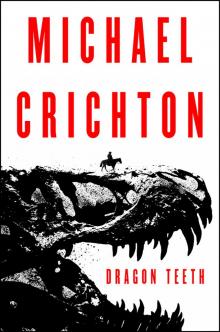 Dragon Teeth
Dragon Teeth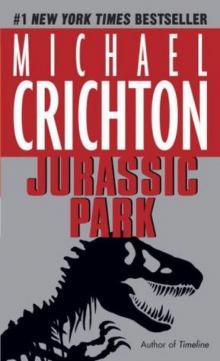 Jurassic Park
Jurassic Park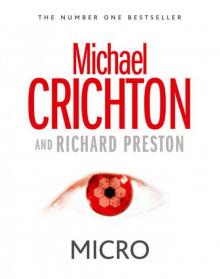 Micro
Micro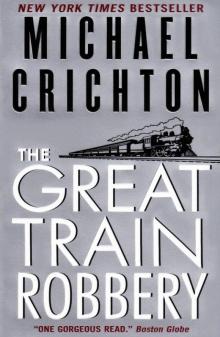 The Great Train Robbery
The Great Train Robbery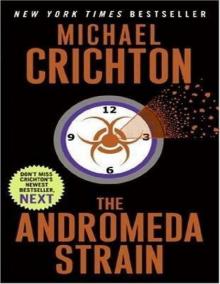 The Andromeda Strain
The Andromeda Strain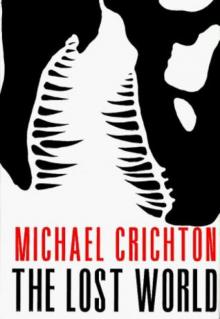 The Lost World
The Lost World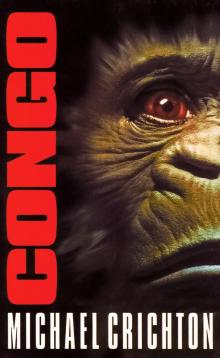 Congo
Congo Travels
Travels Timeline
Timeline Sphere
Sphere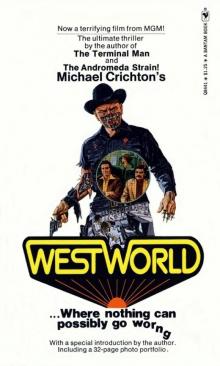 Westworld
Westworld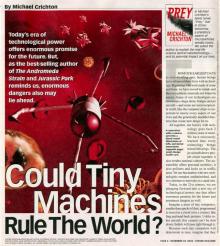 Prey
Prey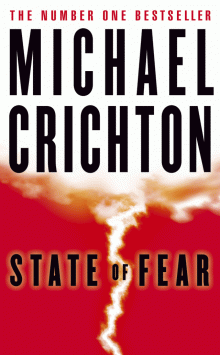 State Of Fear
State Of Fear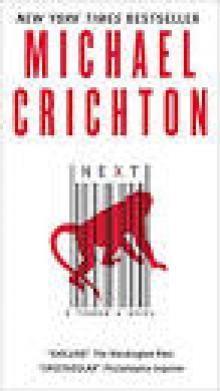 Next
Next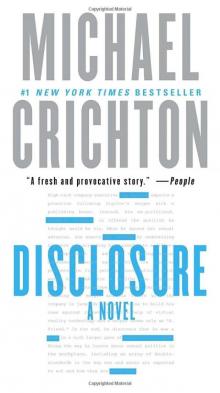 Disclosure
Disclosure Pirate Latitudes
Pirate Latitudes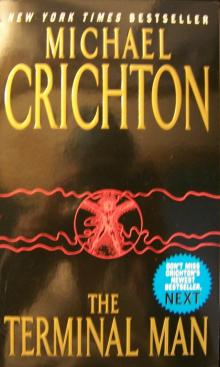 The Terminal Man
The Terminal Man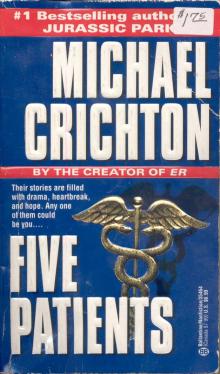 Five Patients
Five Patients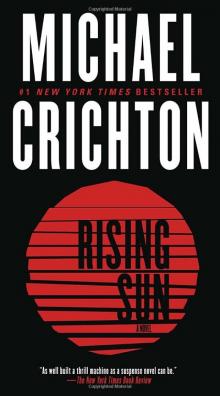 Rising Sun
Rising Sun Binary
Binary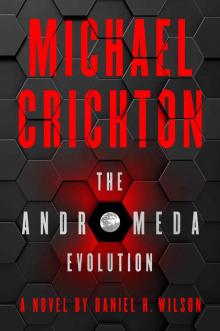 The Andromeda Evolution
The Andromeda Evolution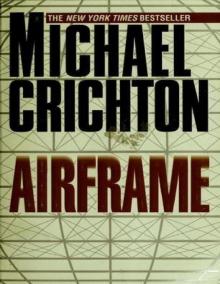 Airframe
Airframe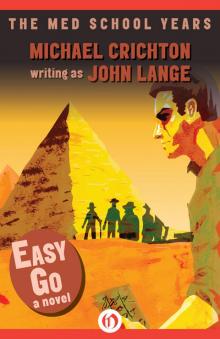 Easy Go
Easy Go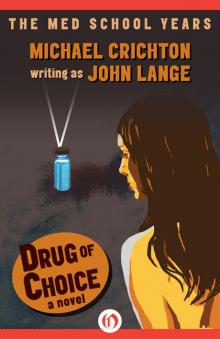 Drug of Choice
Drug of Choice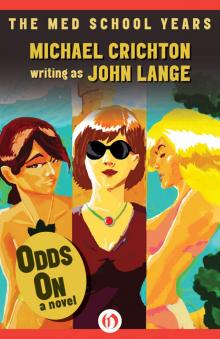 Odds On: A Novel
Odds On: A Novel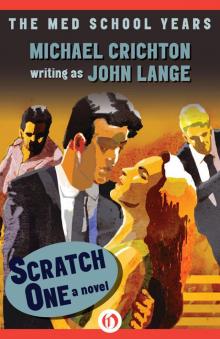 Scratch One
Scratch One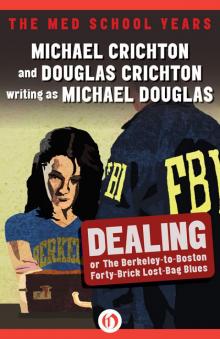 Dealing or The Berkeley-to-Boston Forty-Brick Lost-Bag Blues
Dealing or The Berkeley-to-Boston Forty-Brick Lost-Bag Blues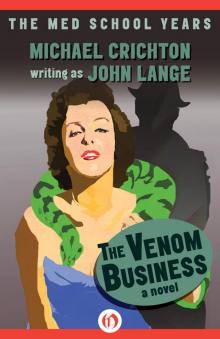 Venom Business
Venom Business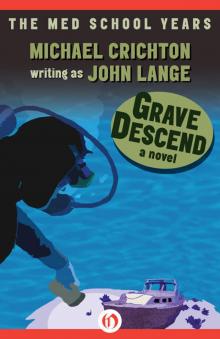 Grave Descend
Grave Descend Gold - Pirate Latitudes
Gold - Pirate Latitudes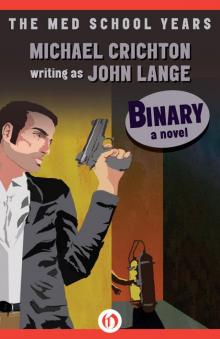 Binary: A Novel
Binary: A Novel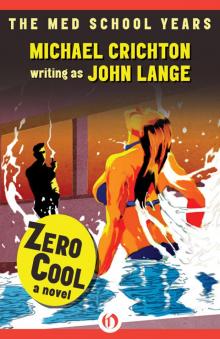 Zero Cool
Zero Cool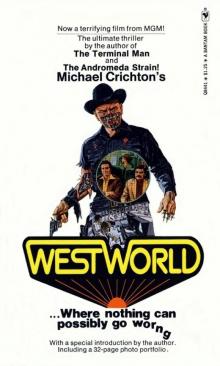 Delos 1 - Westworld
Delos 1 - Westworld